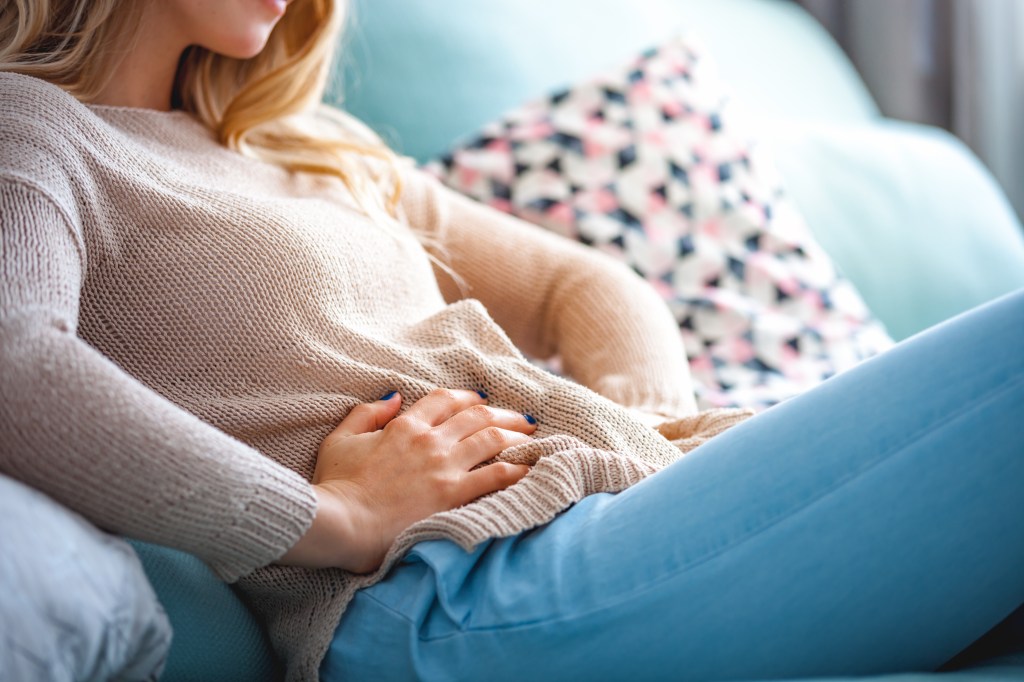If you’re anything like me, the Thanksgiving post-meal bloat is as much of a holiday tradition as turkey, mashed potatoes, or the parade on TV. It just comes with the territory: I stuff down as much food as I can, then I lie there like a slug to deal with the consequences. But as it turns out, bloating after a big meal doesn’t have to be as inevitable as the football game on TV or pumpkin pie — though it’s understandable why we’d think so.
“Eating too much, too fast, or eating very rich fatty foods often cause bloating,” says gastroenterologist Dr. Roshini Raj, founder of Yay Day — so check, check, and check for Thanksgiving and other big holiday meals. Basically, when we eat large meals too quickly, our stomach expands to accommodate all that food, which can lead to discomfort, Dr. Raj explains.
Eating quickly also doesn’t give our bodies enough time to digest, and we’re also more likely swallow air, “which leads to more gas in the digestive tract,” she explains. And it doesn’t help when you’re chowing down on fatty foods like gravy and stuffing. “Fat takes longer to digest than carbohydrates or protein, so a high fat meal can make you feel more bloated,” Dr. Raj tells SheKnows.
While all those things may feel hard, if not impossible, to avoid during the holidays, there are a few key things you can do to prevent major bloating or make it more manageable. We asked Dr. Raj and registered dietitian Gisela Bouvier for their best advice to prevent and deal with bloating before, during, and after a big holiday meal, so you can have your pumpkin pie (and turkey, and mashed potatoes, and gravy…) and eat it too.
How to Prevent Bloating Before a Meal
What you do before you start chowing down is crucial when it comes to avoiding bloating. Here’s how to set yourself up for success:
Have a protein- and fiber-rich breakfast: “Starting your day with a protein- and fiber-rich breakfast will help you feel satisfied longer, helping to minimize grazing and mindless eating,” Bouvier tells SheKnows. She also recommends eating food combinations that combine both probiotics — the “good” bacteria that keep your gut healthy and reducing gas and bloating — and fiber. Foods that are naturally rich in probiotics include yogurt, kimchi, sauerkraut, and kefir. (Bouvier likes this seasonal kefir smoothie recipe, which also includes an apple for fiber content.)
Eat smaller meals before the big one: It’s tempting to save your appetite for the big meal, but don’t take it too far. “Prepping your body with smaller, balanced meals can prevent you from overeating at dinner,” Bouvier explains. Make sure to have breakfast and, depending on when you’re eating, a satisfying lunch before your main holiday meal.
Opt for still water and non-carbonated drinks: “Hydration before the meal aids digestion, but skip the fizzy drinks to reduce gas intake,” Bouvier says. You want to avoid introducing that excess air into your digestive system, which will only add to bloating.
Try prebiotics: Regularly taking prebiotics — fiber rich foods or supplements that “feed” the good bacteria in your gut — “can help balance your microbiome which reduces bloating in general,” Dr. Raj says. You can try prebiotic supplements or opt for naturally prebiotic-rich foods like whole grains, fruits, vegetables, beans, and nuts.
Fit in some exercise, if you can: Even if you don’t have a full turkey trot planned, getting a bit of exercise before a big meal can help prevent bloating. A little movement “tends to help your digestion function more smoothly which means less bloating,” Dr. Raj explains.
How to Manage Bloating During a Meal
Bloating is probably the last thing you want to think about during a big, tasty holiday meal — and we get it — but there are a few small things you can do while you’re eating to make yourself more comfortable later. Keep these things in mind while you’re enjoying your turkey and potatoes:
Opt for smaller portions: We know it’s tempting to load up on all your favorites, but try getting smaller portions for your first round. (You can always go back for more!) It’s especially good to have moderate portions of rich, fatty foods, Dr. Raj said, as well as smaller servings of “gas-producing vegetables like broccoli, cauliflower, cabbage, Brussels sprouts, and beans.” If you’re lactose intolerant, dairy products might also lead to bloating. It’s also a good idea to check in with your hunger cues as you go, Bouvier adds, so you know when you’re approaching fullness and avoiding eating past your limit.
Chew slowly: “Take time to chew your food thoroughly and enjoy each bite,” Bouvier advises. Not only will you get more satisfaction out of your meal, but “smaller food particles are easier to digest,” she explains. Plus, “slow eating reduces swallowed air,” which in turn reduces bloating and gas.
Choose a variety of foods: “Incorporate a balance of lean proteins, healthy fats, and complex carbs, and foods that may be less nutritious that you enjoy,” Bouvier says. This helps encourage good digestion and means that you can enjoy the richer, more sugary foods — which are tougher on your digestive system — without overeating them, leading to bloating or GI issues.
How to Deal With Bloating After a Meal
So, you’ve eaten your meal, you thought you were prepared… but you’re still bloated. There are a few things you can do to make it a little more bearable:
Take a gentle walk: “A 10 to 15 minute walk can stimulate digestion and relieve bloating,” says Bouvier. “Walking encourages movement in the gastrointestinal tract, speeding up digestion.” Walking can also help gas move through your body, Dr. Raj adds, and has “been shown to help with glucose metabolism.”
Avoid lying down right after eating: All you want to do after a big meal is lie down and take a nap, but this (unfortunately) isn’t the best choice for your digestive system. Bouvier recommends waiting at least two to three hours before lying down to prevent acid reflux or slow digestion. “Staying upright helps food move through the digestive tract efficiently,” she explains.
Have some herbal tea: Herbal teas are a good natural remedy for bloating and digestion aid, Bouvier says. Try chamomile, which contains anti-inflammatory properties that “ease digestive discomfort,” or matcha, which can help regulate digestion and relieve bloating.
Some bloating after a big meal is to be expected — and is totally worth it, TBH, especially around the holidays. While this kind of occasional bloating is common, Dr. Raj says, it’s good to talk to a doctor if you experience frequent bloating, which could be a symptom of something like celiac disease or irritable bowel syndrome.
Still, even when it’s only occasional, no one enjoys the discomfort and overfull feeling of being bloated. If a few small changes can make it more tolerable, well, sign us up and pass the turkey!
Before you go, shop our favorite non-water beverages that help you stay hydrated:




